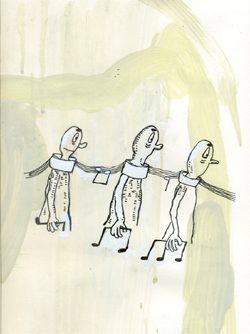 You may have heard about the RIAA’s recent major victory in court. Although over 20,000 lawsuits have been filed by the RIAA against people who file share music, only one, so far, has made it to a court room. Everyone else had the good sense to settle out of court for a few grand.
You may have heard about the RIAA’s recent major victory in court. Although over 20,000 lawsuits have been filed by the RIAA against people who file share music, only one, so far, has made it to a court room. Everyone else had the good sense to settle out of court for a few grand.
But Jammie Thomas, 30, a single mother from Brainerd, Minnesota, says she was wrongfully targeted by SafeNet, the RIAA’s net detective that patrols the Internet for illegal file sharing. She found a lawyer, Brian Toder, who thought he could help her beat the rap. Maybe Toder thought that the public’s sense of disgust with the RIAA would help fuel an acquittal for Thomas, but it didn’t. He should have relied on something far more predictable in determining his client’s chances—basic copyright law.
A jury took less than five hours to decide her fate. Result: the single mother will pay $9,000 per song for twenty-four of the roughly 1,700 songs in question, not including the $60,000 she owes Mr. Toder.
But while the mom is suffering, Toder’s Google factor is up. Only a month ago, it was about 2,000 links. As of today, it’s over 9,000. So there is a happy ending on the defendant’s side of the table after all.
Naturally, the tech trades have spun this into a mass conspiracy by the record labels to disenfranchise the public. But we know their agenda—painting record companies as heartless and greedy to plunder all the profit for themselves.
What gets me scratching my head are the many people in chat rooms such as absolutepunk.net with comments like, “The RIAA should realize that this is ‘biting the hand that feeds you.’ They’re just continuing to dig their grave deeper and deeper.” They think that this is bad news for the music industry. They are wrong. A public relations black eye is the least of our industry’s worries. Staying alive is the real concern.
Keep in mind something that these people are missing: though technically, even downloading one song is illegal, the RIAA doesn’t care about a song or two—or even a few dozen. Their radar is designed to catch people who share (read: distribute) many, many songs (they have a secret threshold). So it’s like that old urban legend about pot: you can buy it and possess under an ounce without much trouble, but selling it will land you in the slammer.
Unfortunately, one cannot exist without the other. Just as there can be no buyers without a seller, there can be no downloaders without uploaders. And uploaders just took a big pie in the face.
Activity on services like LimeWire will surely be affected, and I’ll be curious to see what BigChampagne (a company that monitors internet activity) says about all this in six months. I’d put my money on sharing being down, but only by a small tick.
I know there are few tech-savvy people out there saying, “But wait…what about BitTorrent? Won’t this make it impossible to determine who is doing what?”
BitTorrent is a system that takes one song file and divides it up into many little parts and places, each part on a different computer in the network. When you download a song from a sharing service (like LimeWire), the service is actually connecting many computers and orchestrating each part to you for reassembly. This makes it very hard to trace who is responsible, right?
Wrong! And here’s the bad news.
The RIAA likely will take the position that this makes everyone on a network equally culpable.
If it’s proven legally sound, the RIAA may be able to charge every single person on a sharing network and claim all of them equally liable for each other’s activity. So instead of a single source getting nailed for say, 1,000 infringements (which the peer-to-peer [P2P] hydra can easily survive), they could charge everyone with hundreds of thousands of infringements. And that would be everyone who ever participated in an illegal BitTorrented, P2P model once.
That, of course, means just about everyone involved with music production.
For ripping free music, the price of poker just went way up.
-Column by Moses Avalon
Moses Avalon is former record producer and recording engineer who has worked with Grammy winning artists and received RIAA platinum records. He is now one of the nation’s leading music business consultants and artists’ rights advocates and author of a top-selling music business reference, Confessions of a Record Producer. More of his articles can be seen at www.mosesavalon.com.
